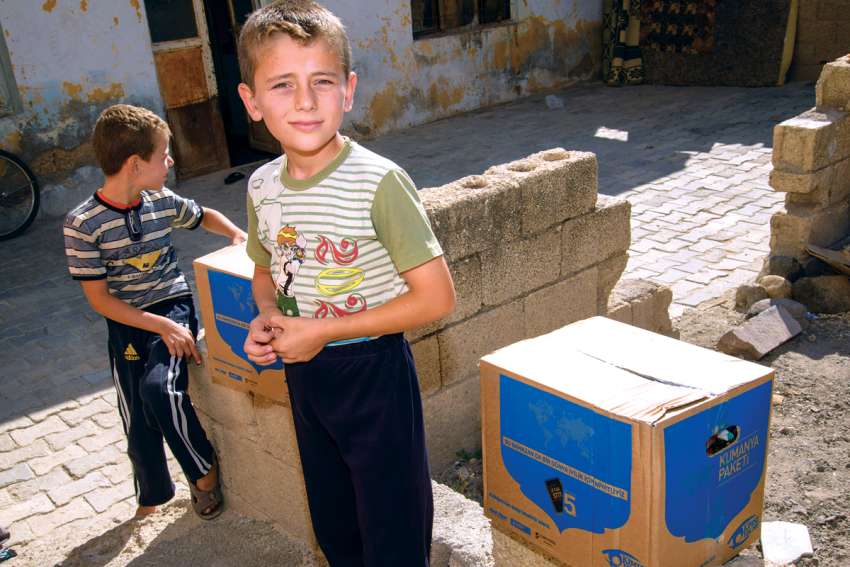Until 2016, Cetirner was executive director of a Turkish disaster response and humanitarian aid organization called Kimse Yok Mu. The organization was founded during the last major Turkish earthquake which struck in the northeast of Turkey in 1999.
Today Kimse Yok Mu doesn’t exist and its dedicated and trained volunteers aren’t responding to the disaster that has felled 10 cities in Turkey’s southern region, including Kilis.
The name of the organization means “can anybody help,” which was the sentence Turks heard shouted out from beneath the rubble in 1999.
“Our name was really a very emotional name. It was touching to the heart,” Cetirner told The Catholic Register on a Zoom call from the Houston charter school where today he is an administrator.
Kimse Yok Mu was a non-profit, volunteer foundation that had massive support among Turks. It had 12 branches in Turkey and about 450 trained search and rescue volunteers. In a short 15-year span, it had sent rescue teams to Tacloban in the Philippines in response to Typhoon Haiyan, to Haiti following the 2010 earthquake and to a dozen other major natural disasters.
But it was more than just search and rescue. The Turkish organization mounted longer-term development projects to help people in disaster zones rebuild. In response to flooding in Pakistan, Kimse Yok Mu constructed a medical building, shopping centre and 300 houses. In 2015 this reporter witnessed Kimse Yok Mu at work among Syrian refugees who had just arrived in the southern border town of Kilis, distributing food, securing housing and counselling the traumatized.
Kimse Yok Mu was part of a network of Turkish Muslim organizations inspired by Turkish Imam Fetullah Gulen. At the centre of this network was the international Hizmet movement, which tried to live out the teaching of its Muslim spiritual master through dedication to service, often in education and medicine, in Turkey and around the world. The leadership of Kimse Yok Mu were all members of Hizmet.
Hizmet’s reach was wide and deep in Turkish society, particularly among a rising middle class. It cultivated friendships among business owners and investors. The Hizmet-aligned newspaper Zaman and its associated television channel helped Kimse Yok Mu get started and grow quickly.
A coup attempt in 2016, led by a faction in the Turkish military, transformed the nation’s politics and spelled doom for Hizmet and Kimse Yok Mu. Turkish President Recep Tayyip Erdogan claimed the coup was masterminded and orchestrated by Hizmet members under the direction of Gulen, who lives in exile in Pennsylvania.
Erdogan responded to the coup with mass arrests of some 40,000 Turks. In the years that followed more than 77,000 more were arrested and 160,000 fired from their jobs for suspected connections to Hizmet, or for advocating Gulen’s religious ideals. Kimse Yok Mu was one of dozens of civil society organizations shut down.
“Turkey lost a lot,” Cetirner said. “When I watch the news from Turkey, really it touches my heart. Sometimes I cry.”
Kimse Yok Mu made no secret of its inspiration, but many who volunteered or donated to the organization were not members of Hizmet, attached to the teachings of Gulen, even religious.
Erdogan’s boot landing on religious freedoms has had dire consequences for Turkish democracy, said the editor in chief of Politurko.com, a Hizmet-affiliated news website out of New Jersey.
“If a government is pretending to be very strong in authoritarian countries, they don’t have strong civil societies,” said Aydogan Vatandas. “They don’t allow the civil society organizations to get organized.”
In Vatandas’ view, Turkey hasn’t just lost capable, trained rescuers with experience in earthquake zones. Kimse Yok Mu also represented a certain democratic frame of mind and sense of citizenship.
“They have a servant-leadership style,” he said. “They lived to serve others. This concept also exists in Christian leadership. It’s very similar to a Christian leadership style.”
Cetirner draws a contrast between his defunct, faith-inspired organization and the Turkish government’s response to the earthquake today.
“Government was very late to organize search and rescue. Why? Because this government was not thinking like that. They work with the people loyal to them. But loyalty, sometimes it is not working. You may be loyal to President Erdogan, but if you don’t have search and rescue skills, if you don’t have some training, what will you do?” Cetirner asked.
Turkey has suffered a devolution of social trust since Erdogan’s crackdown on Hizmet
“Turkish people have lost their trust in the government,” Cetirner said. “Our advantage was, people trusted Kimse Yok Mu. That was our power. (But) we need democracy to survive.”
The leading Turkish charity gathering aid for earthquake victims today is the Ahbap Association, founded in 2017 by 1990s Turkish rock star Haluk Levent. Government officials and allied media personalities have begun attacking Levent and Ahbap in social media, while the government’s own fundraising efforts have faltered.
Social trust, a sense of citizenship rooted in love of others, even strangers, and servant-leadership — “Turkey lost this power. We (Kimse Yok Mu) lost something, but Turkey lost,” said Certiner.
Behind that power was a religious ideal, said Halil Yurtsever, director of the Hizmet-allied Intercultural Dialogue Institute in Toronto.
“Gulen, what he taught us — an important thing was — if God gave you a chance to live, make other people live,” Yurtsever said. “In making them live, you will live.”

